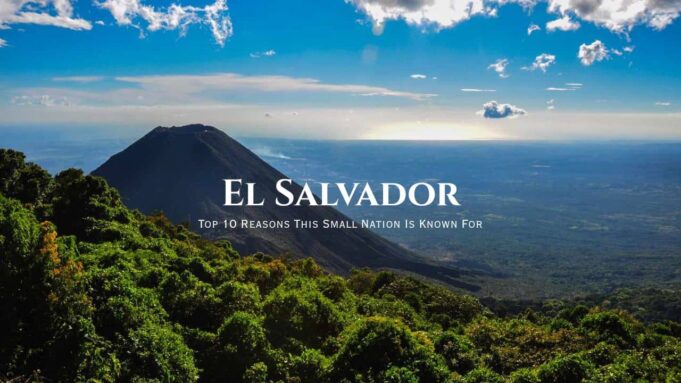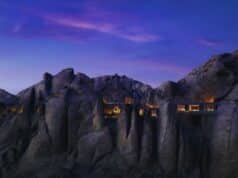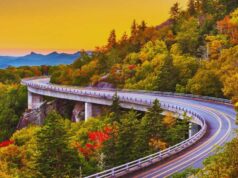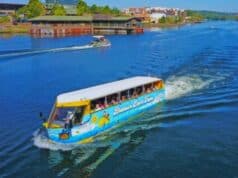El Salvador, the smallest country in Central America, packs an impressive amount of beauty and culture into its compact borders. What Is El Salvador Known For? It’s celebrated for its vibrant traditions, friendly locals, and breathtaking scenery that offer visitors an experience both authentic and unforgettable.
From towering volcanoes to golden-sand beaches, and from centuries-old archaeological sites to bustling modern cities, the country is a blend of natural wonders and cultural richness. In this article, we’ll explore El Salvador’s dramatic landscapes, world-class surfing scene, and other features that make it stand out on the global stage.
What Is El Salvador Known For? Top 10 Reasons This Small Nation Shines
1. Stunning Natural Landscapes
When asking what El Salvador is known for, one of the top answers is its striking volcanic terrain, earning it the nickname “Land of Volcanoes.” With more than 20 volcanoes, many still active, the scenery is as dramatic as it is beautiful. Along the Pacific coast, beaches like El Tunco and El Zonte attract visitors with their sunsets and laid-back atmosphere. Inland, national parks such as El Boquerón and Montecristo offer lush hiking trails, cloud forests, and panoramic views. From coastal relaxation to highland adventures, El Salvador’s natural beauty is unforgettable.
2. World-Class Surfing
For surf enthusiasts, El Salvador has earned a reputation as one of the top surfing destinations in the world. The country’s Pacific coastline is lined with consistent waves that attract professionals and amateurs alike. Spots like Punta Roca, El Sunzal, and Playa Las Flores are known for their long rides and ideal conditions. International competitions have put El Salvador firmly on the global surfing map, while local surf schools and businesses have flourished as a result. Surf tourism not only boosts the economy but also fosters a growing cultural exchange between locals and visitors from around the world.
Read More: El Salvador Beaches
3. Coffee Production
Coffee has long been a cornerstone of El Salvador’s economy and identity. Since the late 19th century, coffee cultivation has shaped both the landscape and the livelihoods of countless Salvadorans. Grown primarily in the country’s high-altitude regions, Salvadoran coffee is prized for its smooth, balanced flavor profiles, often with notes of chocolate and citrus. Coffee farms, many of them family-owned for generations, dot the hillsides and offer guided tours where visitors can learn about the cultivation, harvesting, and roasting processes. Beyond its economic role, coffee is deeply embedded in Salvadoran culture, symbolizing hospitality and community.
4. Mayan Heritage and Archaeological Sites
What is El Salvador known for historically? El Salvador holds a rich legacy of Mayan history, reflected in its impressive archaeological sites. The most famous is Joya de Cerén, a UNESCO World Heritage Site often called the “Pompeii of the Americas” for its remarkably preserved glimpse into everyday Mayan village life. The ruins of Tazumal in Chalchuapa feature towering pyramids and ceremonial structures, while San Andrés showcases ancient plazas and artifacts that tell the story of pre-Columbian civilizations. These sites not only highlight the country’s deep historical roots but also influence modern Salvadoran traditions, from artisan crafts to ceremonial celebrations.
5. Pupusas and Traditional Cuisine
No visit to El Salvador is complete without tasting pupusas, the national dish. These thick, hand-made corn tortillas are filled with ingredients such as cheese, beans, or seasoned pork, and served with curtido (pickled cabbage) and salsa roja. Pupusas are more than just food—they are a social tradition, often enjoyed at family gatherings, local markets, and roadside eateries. Beyond pupusas, Salvadoran cuisine features hearty dishes like tamales, crispy yuca frita, and sweet atol de elote. Food plays a central role in Salvadoran life, bringing people together and reflecting the country’s agricultural heritage and culinary creativity.
Read Also: Fiesta de San Salvador in El Salvador
6. Festivals and Cultural Celebrations
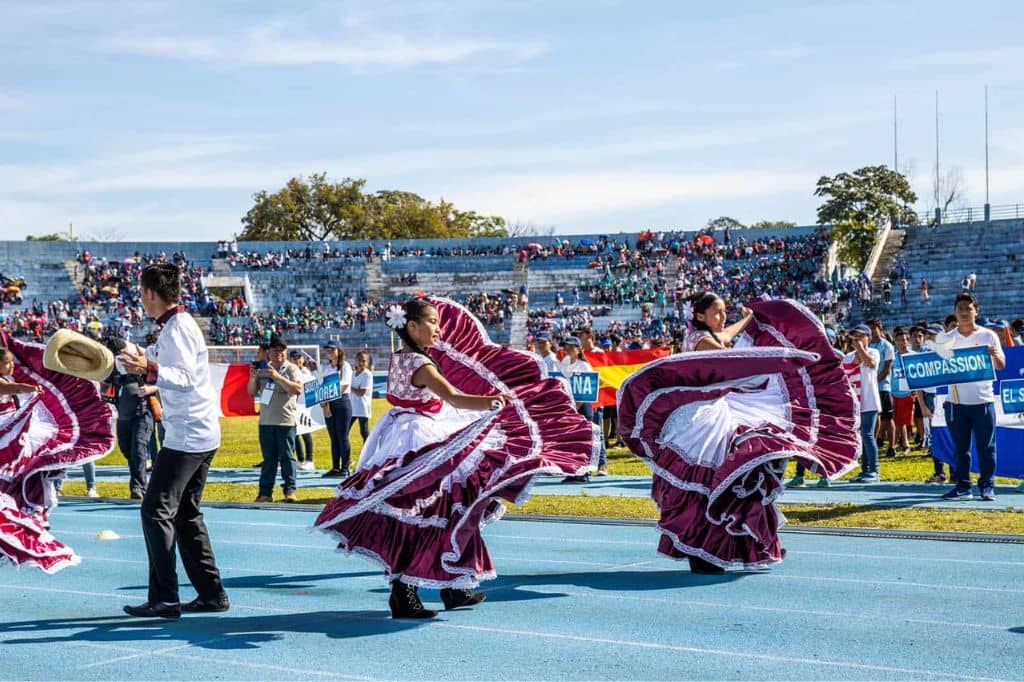
El Salvador’s vibrant calendar is filled with festivals that showcase its deep cultural roots and joyous spirit. The Fiesta de San Salvador, held in August, honors the country’s patron saint with processions, parades, and religious ceremonies. The August Festival transforms the capital into a hub of music, dance, and street performances, while Semana Santa (Holy Week) is marked by elaborate processions, colorful alfombras (sawdust carpets), and traditional foods. Throughout the year, folk music, marimba rhythms, and lively dances like the torito pinto bring communities together, celebrating a blend of indigenous, Spanish, and modern influences.
7. Warm and Hospitable People
At the heart of El Salvador’s charm are its people, known for their warmth, generosity, and welcoming nature. Hospitality is deeply ingrained, with visitors often treated like extended family. Family and tradition are central to daily life, influencing everything from holiday celebrations to communal meals. Local customs, such as greeting with a friendly handshake or sharing a home-cooked meal, reflect the value placed on connection and community. For travelers, this genuine warmth transforms a trip into a meaningful cultural exchange, leaving lasting memories far beyond the country’s scenic landscapes.
8. US Dollar and Ease of Travel
One of the conveniences for international visitors to El Salvador is its use of the US dollar as the official currency, eliminating the need for currency exchange for many travelers. In recent years, the country has made notable strides in improving safety and developing its tourism infrastructure, with better roads, accommodations, and guided tour options. International airports and efficient transportation services make getting around easier, while the compact size of the country means visitors can experience both beaches and mountains in a single day. These factors combine to make El Salvador a surprisingly accessible and hassle-free destination.
Also Read: Fagradalsfjall Volcano
9. Famous People and Global Recognition
Though small in size, El Salvador has produced influential figures who have made their mark in politics, sports, music, and art—adding to the list of what El Salvador is known for. In politics, leaders such as José Napoleón Duarte, who guided the nation through a turbulent period in the 1980s, and current president Nayib Bukele, whose modern and unconventional approach has gained global attention, stand out.
In sports, soccer legend Jorge “Mágico” González is celebrated as one of the greatest players Central America has ever produced, admired for his skill and flair on the field. The arts have also flourished, with musicians like Álvaro Torres earning international acclaim for romantic ballads and visual artists such as Fernando Llort leaving a lasting cultural legacy through colorful, folkloric designs. Beyond its borders, the Salvadoran diaspora has enriched global culture, with athletes, actors, and musicians of Salvadoran heritage achieving recognition in the United States, Canada, and beyond.
10. Challenges and Resilience
El Salvador’s history is marked by resilience in the face of adversity, another defining aspect of what El Salvador is known for. Positioned in the Pacific Ring of Fire, the country experiences frequent earthquakes, volcanic activity, and seasonal hurricanes. These natural hazards, combined with social and economic issues such as poverty, inequality, and security concerns, have tested its strength as a nation.
Yet in recent years, significant improvements in public safety, infrastructure, and economic innovation have fueled optimism for the future. Through it all, the Salvadoran people have demonstrated an enduring spirit—one defined by hard work, creativity, and a determination to overcome challenges. This resilience is not only a survival mechanism but also a source of national pride, woven into the country’s cultural identity.
Read More: Iceland Volcano Eruptions
Conclusion
El Salvador may be the smallest nation in Central America, but it offers an incredible range of experiences that rival much larger countries. What Is El Salvador Known For? From volcanic peaks and surf-friendly beaches to ancient Mayan ruins, rich coffee culture, and the warmth of its people, the country leaves a lasting impression on all who visit. Its festivals, food, and natural beauty create a colorful tapestry of culture and adventure. For travelers seeking authenticity, variety, and heartfelt hospitality, El Salvador is a destination that delivers unforgettable moments at every turn.


